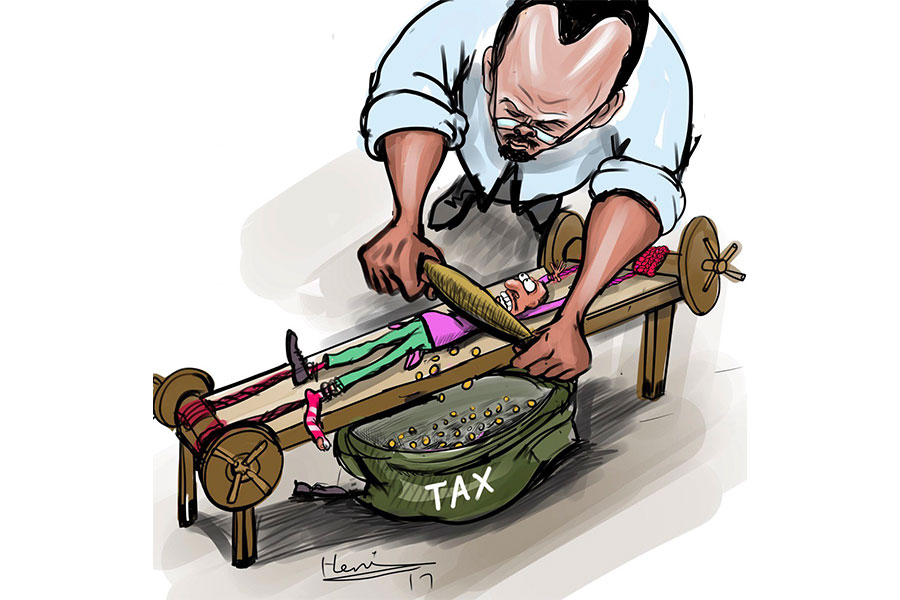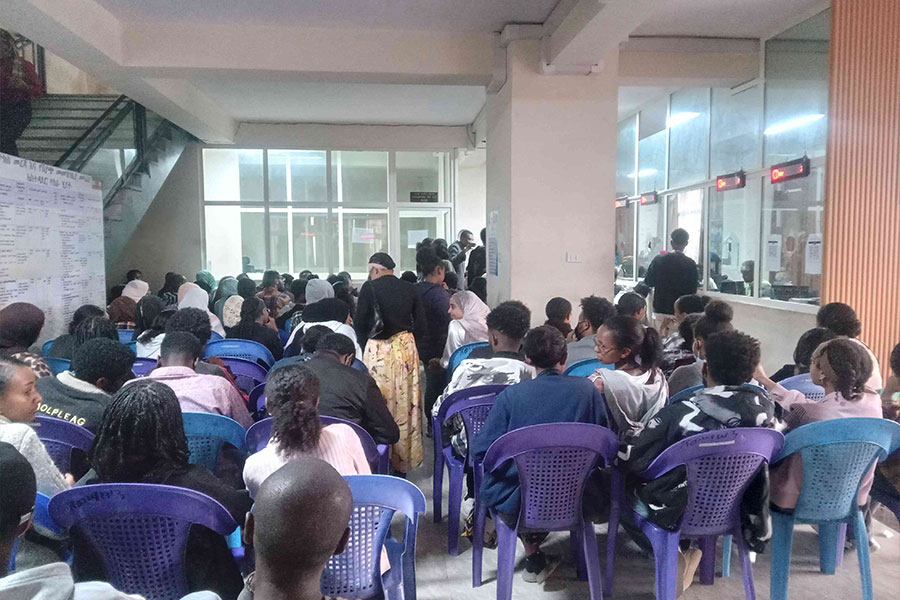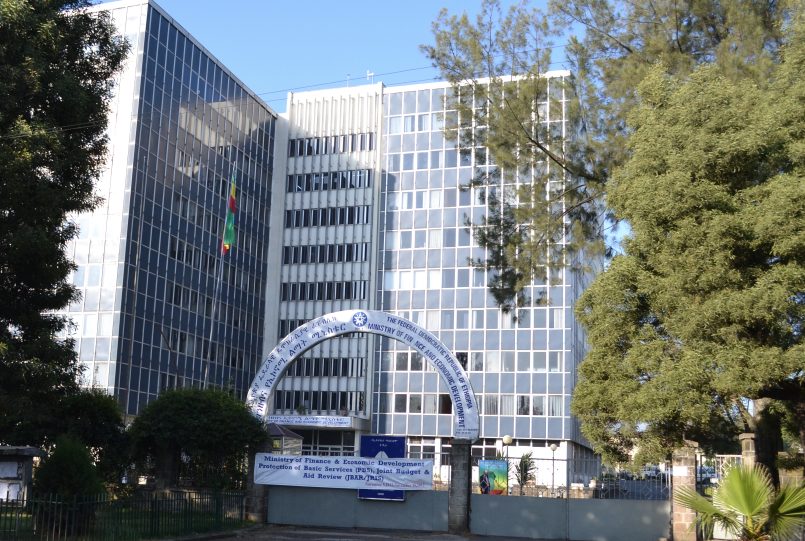
Fineline | Nov 30,2019
Oct 14 , 2023.
A tax storm is brewing in Addis Abeba. It harks back to an antiquated 'Wall & Roof' levy, inactive for nearly half a century, now dusted off and thrust upon property owners with newfound vigour. But the attempt by the Addis Abeba officials to fill the City Administration’s coffers and the federal ambition to respond to a looming budget deficit has sparked more than just routine grumblings over higher bills. They have spotlighted the fundamental principles of taxation and, more worryingly, exposed cracks in the state’s relationship with citizens.
At a joint session of Ethiopia’s legislative chambers last week, President Sahle-Worq Zewde laid bare the fiscal ambition of the federal government.
A 441 billion Br in tax revenues is eyed, claiming a share of 60pc of the federal budget for the current fiscal year. Property tax, value-added tax from expanded services, and revised excise taxes are the chosen trident of the Ministry of Finance. Yet, where almost every government reaches into the purses of its citizens, a suite of principles has evolved to ensure this is done equitably, efficiently, and without undue fuss.
But Addis Abeba’s recent antics with the ‘Wall & Roof’ tax, which have seen its earnings multiply 53-fold to an eye-watering 2.5 billion Br, have proven less than smooth. Inflated fees, surprise mid-year impositions, and insensitivity to the existing inflationary anguish have provoked a public outcry. If only the authorities have the temperament to listen.
A mere 27pc of Addis Abeba’s land is incorporated within a cadaster system, a modern-day marvel ensuring that property records mirror ground realities. Beyond the capital, such systems are almost non-existent. Unless a parallel effort exists to build this foundational data infrastructure, the state’s fiscal ambitions may merely stoke corruption and fan flames of discontent.
Historically, the tension between the taxpayer and the taxman is as old as the hills. But Addis Abeba’s recent approach runs the risk of clotting an antagonistic dynamic, one where citizens are presumed tax dodgers until proven otherwise. Such brute force approaches not only drain goodwill; they also threaten long-term trust in state institutions. Weighty financial impositions should stem from robust debates, not whimsical diktats from the depths of bureaucratic corridors.
Indeed, Ethiopia’s challenges with taxation lie deeper. Yet the broader question remains: is the property tax the proper medicine for Ethiopia’s economic malaise?
At a time when households battle inflationary headwinds, a result of the current administration’s monetary policies - largely - this move seems more of a diversion than a cure. A brief reflection on recent fiscal history reveals an intricate story.
The federal budget deficit, a gulf between public spending and revenue, stood at 76.5 billion Br last year. Admittedly, this was a shade better than the previous year’s 95.1 billion Br chasm. Yet its financing has relied heavily on borrowing, both domestic and foreign. While revenues limped to 87.7 billion Br in the last fiscal year’s third quarter (the latest available data), nudging a modest 1.1pc year-on-year (YoY) increment, tax contributions shone, swelling by a hearty 14.4pc YoY leap to 85.4 billion Br.
While indirect tax - driven by domestic and foreign trade taxes - displayed an auspicious 21.9pc surge, the dwindling direct tax numbers, shrunk by 7.9pc, unsheathes the gashes in tax mobilisation. It underscored potential anomalies in the country’s economic genesis.
Alarm bells should also ring over the plummeting non-tax revenues, down by nearly half.
The non-tax revenues, nosediving by 46.6pc, invoke concerns about the federal government’s capacities in revenue mobilisation outside of its tax sphere, potentially highlighting structural inefficiencies or resource management problems. However, under this veneer of austerity, allocations towards regional transfers have swelled by 43.2pc to 72.3 billion Br, perhaps hinting at shifting budgetary priorities. Macroeconomic pundits would, however, argue that regional state bosses have little to celebrate from such spikes if they consider the amount they received in forex terms.
The methods of bridging the fiscal gap are also telling.
Last year saw a shift towards external borrowings, juxtaposed with significant domestic debt reduction. Such shifts, while subtle, hint at a recalibration of strategies in the face of domestic or global forces.
While revenues strive to burgeon, expenditures have also inflated, posing a stark contrast in macroeconomic management. With an outlay of 164.3 billion Br in the third quarter, the federal government marginally suppressed total spending by 5.6pc compared to 2021/22. A dramatic swing towards net external borrowings to 7.4 billion Br, contrasted against the previous year’s net repayment, and a 53.7pc curtailment in net domestic borrowings to 54.9 billion Br, may signify a nuanced shift in strategy, potentially driven by either international dynamics or a recalibration of domestic debt management tactics.
Macroeconomic policymakers' juggling act between manoeuvrings through the delicate terrains of revenue mobilisation and judiciously amplifying expenditures underlines an intricate balance of strategic fiscal sustenance and economic boost. Whether Ethiopia’s fiscal ship can sail through these rough economic waters while safeguarding its developmental and socio-economic imperatives remains an unfolding economic enigma. However, the imposition of property tax should be the last fiscal arsenal to be deployed in addressing this structural issue.
In such a fiscal landscape, property taxes, designed to empower local communities, seem a strange choice for addressing federal budgetary shortfalls. In essence, these taxes should offer a social contract: property owners part with their money in exchange for meaningful public services in health, education, and infrastructure at the wereda and district administrative levels.
Any vigorous tax system rests on certainty. History is replete with tales of popular uprisings against perceived fiscal injustices. Introducing a cascade of taxes in an already volatile economic and political environment seems a gamble for Ethiopia’s contemporary leaders. The need of the hour should be an all-encompassing tax policy consistent with long-term monetary plans, shielding the fragile economy from further jolts. Short-term tax gains might provide brief fiscal relief, particularly those sans public consensus.
But, wielded by an overzealous bureaucracy in a charged political climate, they may extract a heavier toll from property owners.
A revisit of tax principles, emphasising equity, efficiency, and predictability, is imperative. Any successful fiscal strategy would instead drive the country’s dwindling domestic investment. Ethiopia’s current tax experiment, an amalgamation of historic levies and modern ambitions, will inevitably shape its socio-economic course. The hope is that it will steer towards a harmonious balance of the authorities' ambitions and citizen welfare rather than a divisive tug-of-war.
PUBLISHED ON
Oct 14,2023 [ VOL
24 , NO
1224]

Fineline | Nov 30,2019

Editorial | Jul 19,2025

Agenda | Sep 13,2025

Fortune News | Oct 05,2025

Fortune News | Dec 30,2023

Fortune News | Aug 03,2019

Radar | Nov 27,2018

Radar | Sep 27,2025

Commentaries | Jan 04,2020

Fortune News | Apr 19,2025

Photo Gallery | 171973 Views | May 06,2019

Photo Gallery | 162207 Views | Apr 26,2019

Photo Gallery | 151980 Views | Oct 06,2021

My Opinion | 136335 Views | Aug 14,2021

Dec 22 , 2024 . By TIZITA SHEWAFERAW
Charged with transforming colossal state-owned enterprises into modern and competitiv...

Aug 18 , 2024 . By AKSAH ITALO
Although predictable Yonas Zerihun's job in the ride-hailing service is not immune to...

Jul 28 , 2024 . By TIZITA SHEWAFERAW
Unhabitual, perhaps too many, Samuel Gebreyohannes, 38, used to occasionally enjoy a couple of beers at breakfast. However, he recently swit...

Jul 13 , 2024 . By AKSAH ITALO
Investors who rely on tractors, trucks, and field vehicles for commuting, transporting commodities, and f...

Oct 5 , 2025 . By NAHOM AYELE
In Meqelle, a name long associated with industrial grit and regional pride is undergo...

Oct 5 , 2025 . By BEZAWIT HULUAGER
The federal government is set to roll out a new "motor vehicle circulation tax" in th...

Oct 5 , 2025 . By NAHOM AYELE
The Bank of Abyssinia is wrestling with the loss of a prime plot of land once leased...

Oct 5 , 2025 . By BEZAWIT HULUAGER
The Customs Commission has introduced new tariffs on a wide range of imported goods i...